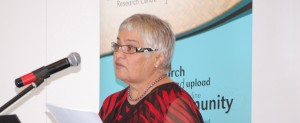
The Te Anga Mua Whānau Ora Research Seminar began just after 9am on 23 November 2012 with a mihi whakatau (welcome). The day was acknowledged as the third day of dialogue about Whānau Ora, with this hui following on from a two-day provider hui called by the Hon Tariana Turia, Minister of Whānau Ora.
MC for the day, Kataraina Pipi, introduced the Minister, the Hon Tariana Turia, who then spoke to the audience. She greeted the local people and thanked Community Research for the invitation to speak about Whānau Ora. The relevance of context to Maori well being was highlighted in her description of Te Whare Waka (the hui location, Wellington Waterfront) and Mason Durie’s Te Whare Tapa Wha. The symbolism of Te Raukura was also described as alluding to both common and distinctive histories across the Pacific.
“Today is about the stories that are the springboard for our success… This is about our survival, on our terms.” Whānau Ora is about success driven by whānau, for whānau, and it’s about bringing comfort, security and care to whānau. An exciting korero from the past two days has been about whānau strengths and potential, and the contribution whānau do and can make to our society and economy. Whānau Ora is about ensuring that this potential is fulfilled.
She encouraged the researchers present at the hui to share best practice with one another. “It’s still early days… and evidence needs to be deepened.” It’s important to share whānau stories without exposing whānau to criticism. Communication while retaining privacy is a big research challenge.
“If Māori are seen as the problem, then we are also the solution” (From her Maiden speech to Parliament).
The Minister then launched the Whānau Ora Research website, expressing her hope that it would be about sharing tools and experiences, and whānau stories.
Kataraina and Nan then sang.
Prof Sir Mason Durie then addressed the hui. He described how outcomes for whānau will be about when we come back to this place in 2037 and see what difference we’ve made, as we can “get a better picture of what’s happened in a generation… Whānau is about generations.” And Whānau Ora is about looking back and planning for future generations.
We can’t ignore the problems, but neither should we be blinded by them. Measurement is therefore about the reduction of adversity and the improvement in whānau achievement.
A major achievement to date has been provider organizations coming together to provide seamless services for whānau.
The interest in outcomes is relatively new in the public sector and Whānau Ora is committed to finding out about whānau outcomes. We need to align good indicators to the Whānau Ora outcomes so that we can measure the difference the initiative makes for whānau.
The attribution of results is complex and different stakeholders will be looking for different methods of attribution. We should look at outcomes experienced by whānau receiving a service as well as what’s happening for all whānau in a community.
We also need to get better about looking at the whānau as a whole, rather than a collection of Individuals. Both qualitative (e.g., stories) and quantitative data are important for understanding the difference Whānau Ora can make for whānau. Funders will want to know if its value for money, whānau will want to know whether its value for time spent.
“Whānau Ora is a model, a philosophy and an approach to building capability.” So it will impact more widely than whānau and Whānau Ora providers – for example, to community and to Iwi.
